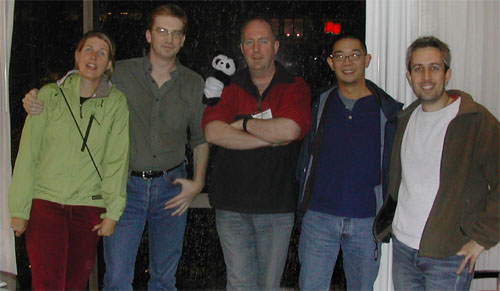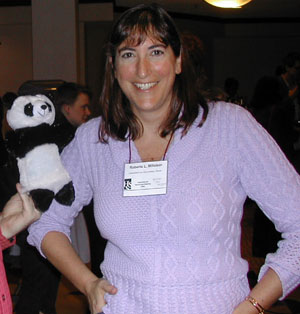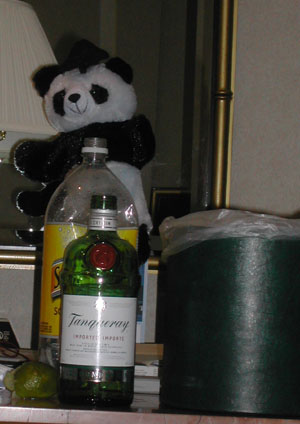I want to blog, but I’m trying to catch up with grading and grant-writing and such in the aftermath of the PSA. I won’t offer a detailed list of excuses like some bloggers I could name. (However, I will say that I’m going to check WebMD to see if intracranial bleeding is a normal reaction to a seminar paper that discusses elan vital.)
Luckily for you, there are a great many blog carnivals which have posted recent editions, including:
Author Archives: admin
What’s your legislative agenda for the first hundred days?
The 110th Congress has been elected. Whether it’s the crowd you voted for or not, there’s quite a lot of talk now about a new direction, a new civility, possibly even a new pony (but I might not have heard that last part right).
So, given that the Congresspersons will be looking for our votes again in another two years (along with a third of the Senators), this seems like a good time for the people (i.e., you all) to put together an agenda for these elected representatives of ours. To streamline things a bit, and in keeping with the overarching themes of this weblog, let’s restrict the wish-list, at least for the moment, to issues to do with science, education, and matters of ethics — broadly construed. It would be good if you could provide a brief description of why your agenda item should be a priority, and whose needs or wants it will serve. If you’ve got a clever plan for funding it, so much the better.
If we can hammer out some good science/education/ethics goals for the legislative branch, I’m prepared to launch a letter-writing campaign to communicate them to the legislators, and a Congress-watch to keep track of how well they do at achieving these goals.
Seems to me that they ought to care what we want even after they’ve gotten our votes. Let’s make sure they know what that is — and that we’ll be watching!
My election day tale of woe.
Actually, after filling out all four sides of my absentee ballot last night (stupid California legislation-by-ballot-measure!), it was really no problem to drop off the ballot at a polling place this morning — there was one in the library of our elementary school, so I swung by after dropping off the kids. There were many occupied voting stations but there was no line to speak of at 7:35 A.M.
The pollworkers at the table checked to make sure I had signed the return envelope as was required, then they put my absentee ballot in the box. As I was turning to go, one of them said, “Hey, do you want a sticker?”
“Sure,” I said. “I can set a good example for my students!”
I accepted the oval “I voted!” sticker, affixed it to my shirt, and was trying to figure out why the pollworkers were looking at me funny as I walked out. Halfway to my car, I understood:
I had put the sticker on upside down.
Get out there and vote, people!
I voted. If you’re registered to vote, you should, too. If you don’t know your polling place, you can check here. If you think you are registered, but you don’t appear on the voter rolls at your polling place, ask for a provisional ballot.
If you have trouble, don’t let it slide! Make some noise:
National Campaign for Fair Elections; phone 1-866-OUR-VOTE (1-866-687-8683).
VoterStory.org
Register complaints about voting machine problems: 1-888-SAV-VOTE (1-888-728-8683).
Please don’t sit this one out! It’s your democracy too!
The dangers of reading a paper at a conference.
Chad Orzel has an excellent post up about good ways to use PowerPoint for a presentation. In a similar vein, I’d like to offer some reasons for academics in disciplines (like philosophy) in which it is the convention to read papers to each other at professional meetings to consider breaking with tradition and not just reading the papers they are presenting.
First, for those of you in science-y fields puzzling over that last sentence: Yes, a great many philosophers really do go places and read their papers to other philosophers. Yes, when I saw it the first time, coming to philosophy via chemistry where people don’t do this, it confused the heck out of me, too. The setting in which this manner of presentation struck me as the most misguided was in department colloquia where the speaker had sent a copy of the paper ahead so that people had time to read it — and indeed, many people in attendance had photocopies of the paper with them at the colloquium — and yet, the speaker still read the paper to these presumably literate members of the audience!
Academic philosophers are a funny bunch, and a complete analysis of their customs is beyond the scope of this post. My goal for the moment is to urge examination of this particular custom — and some of its pitfalls — in the hopes that it may lead to more productive communication at future conferences and colloquia. (Am I looking out for my own interests as a person in the audience for philosophy presentations? You’re darn tootin’!)
The student loan letter.
Something quite unexpected happened to me: I managed to pay off a student loan nearly a year before I go up for tenure! Who’d have thunk it?
Here’s the letter they sent me, with a bit of reading between the lines:
A backward glance at PSA 2006

ScienceBloggers meet in the three-dimensional world: (from left) Janet Stemwedel, John Lynch, Prof. Steve Steve, John Wilkins, David Ng, Ben Cohen.
I managed to get back home last night from the PSA meeting in Vancouver, although just barely. My co-symposiasts got a rental car and headed off to see mountains, an expedition I’d have joined were it not for my plane-missing paranoia. (“You realize that flying home from Vancouver is essentially a domestic flight, so you probably don’t need to check in until about 90 minutes before flight time,” the field trip organizer assured me. But I know what I worry about, rational or not.) Given that the hotel had pretty much cleared of philosophers and historians, I got bored enough hanging around in the lobby that I ended up catching an earlier airport shuttle, which proceeded to get stuck in traffic. No matter, I was still at the airline check-in kiosk 2.5 hours before my scheduled departure time.
And then the kiosk informed me that my flight had been cancelled. AAAAAAAIIEEEEEE!!
One of the remaining human gate agents was able to work out how to get me booked through to another Bay Area airport as my final destination. “But,” she said, “your flight out of here departs in 30 minutes, so you’re going to have to hustle!” Through customs, through security, to a gate in the hinterlands that required that I run across a large connecting tube, down a flight of stairs, across another large stretch, up a flight of stairs, and then a little further to the gate (carrying my coat and shoes the whole time, of course). But I made it.
Off the top of my travel-tired head, here are some observations from this year’s conference:
Panda and philosophers meet paparazzi.
Guest Blogger: Prof. Steve Steve

My adventures with John Wilkins at the PSA meeting in Vancouver continue. Last evening, Wilkins brought me to a reception where I had the pleasure of mingling with a great many philosophers who have made philosophical studies of various aspects of evolutionary biology. Strangely, these minglings were punctuated with camera flashes. Here I am trying to have a word with Robert Brandon as the paparazzi close in on us.

Here I am trying to catch up with Roberta Millstein (who blogged at the much-missed Philosophy of Biology) about her recent move to UC Davis. Once again, some interloper with a camera decided to butt in. How do philosophers manage to carry on a conversation with distractions like these? (Why, for that matter, were there paparazzi in a gathering of academic philosophers?)
A panda’s-eye view of the PSA.
Guest Blogger: Prof. Steve Steve

My esteemed Panda’s Thumb colleague John Wilkins invited me to attend the PSA meeting in Vancouver. It seemed like a good idea at the time, so I agreed.
Last evening started pleasantly enough. I met Wilkins, John Lynch, Ben Cohen and David Ng, and Janet Stemwedel (from whose blog I am writing to you now) for refreshments. Yes, there was a bit of confusion when it turned out that the hotel didn’t have an ice machine on every floor. As well, there was the puzzle of how properly to utilize the fresh limes for beverages in the absence of a knife. (The solution: quick and forceful jabs with a house-key. There was no suitably clever solution to the puzzle of how to extract a cork without a corkscrew, however, so the wine remained in its bottle.) Still, there was lively conversation and good cheer.
After the ScienceBloggers confab, we joined the larger conference reception, where I greeted an important philosopher of science:
Friday Sprog Blogging: make some noise
This week, the elder Free-Ride offspring’s science class was reviewing for a test. (In second grade? Did we used to review for science tests back in second grade? Maybe things have changed since then.) One of the issues in the material they were reviewing was sound, which prompted a discussion that ran beyond the bounds of what will be on the test.
Dr. Free-Ride: So, what do you know about sound?
Elder offspring: Well, sound can travel pretty well through air, and also through a fluid like water.
Younger offspring: That’s why, in swim lessons, you can hear the teacher say, “One, two, three, turn and breathe!” even if you’re keeping your chin down like you’re supposed to.
